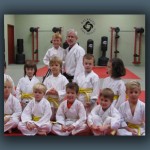 We have all done it; slowed down to let your preschooler win a race to the car, happen to forget where the matching card was in a memory game, miss a shot in a game of HORSE with your son. We do these things because we want our kids to feel good, boost their self-confidence, to keep them from feeling sad. But by losing intentionally, we just may be hurting our kids instead of helping them.
We have all done it; slowed down to let your preschooler win a race to the car, happen to forget where the matching card was in a memory game, miss a shot in a game of HORSE with your son. We do these things because we want our kids to feel good, boost their self-confidence, to keep them from feeling sad. But by losing intentionally, we just may be hurting our kids instead of helping them.
Our children are being raised in a very different world. When we were growing up there was one winner, and they got the trophy, the prize, the shiny medal. Now- a- days every child goes home with a ribbon because we don’t want anyone to feel bad. While a nice gesture, it just may be promoting a generation of entitled kids who don’t know how to deal with losing.
But, the fact is we don’t always win in life. Sometimes the job you applied for goes to someone else, you may get passed over for a promotion or you lose the election for PTA president. But hopefully when those things happen, you are able to accept the loss with dignity and grace. This is exactly how we want our children to act as well. Whether they are playing baseball or a game of monopoly, the only way they will learn how to be a good loser is if they have a chance to lose some times. That is why it is so important that you allow your children to feel the disappointment and show them how to act at home, in a safe environment, so that when it happens at the ballpark or in school they will know how to act.
By losing, your child may become motivated to try harder next time. It can encourage them to practice and improve their skills so that next time they have a better chance at winning the game on their own, getting a better grade on that math test and eventually getting that promotion at work. Losing can also teach your child empathy. Every time they lose, they have a chance to understand what it feels like and how everyone has struggles in life. It is a chance to show them that you value effort more than victories and that it is how we deal with those struggles that life gives us that really matters. Will we be beaten down and give up? Or do we congratulate others who have succeeded and use that experience to work hard so we too can experience our own successes?
So the next time your child says to you, “I’ll race you to the car,” RACE them, and if you win so be it! High five your child and tell them they ran a good race. Sure your child may be sad for a while, but you can use the moment to teach them about losing and winning with grace; so that when a bigger loss comes, they’ll have the skills to handle it!

 If you have read many of my posts, you’ve maybe noticed that no matter what sort of issue I am puzzling over, I always find myself coming back to yin yang theory and balance. When I ask myself what is good or which of two things is better, I always seem to conclude that everything exists in a continuum with its opposite, and that the two are inseparable, and the healthy range of behavior or evaluation on the continuum varies very much depending on the situation.
If you have read many of my posts, you’ve maybe noticed that no matter what sort of issue I am puzzling over, I always find myself coming back to yin yang theory and balance. When I ask myself what is good or which of two things is better, I always seem to conclude that everything exists in a continuum with its opposite, and that the two are inseparable, and the healthy range of behavior or evaluation on the continuum varies very much depending on the situation.